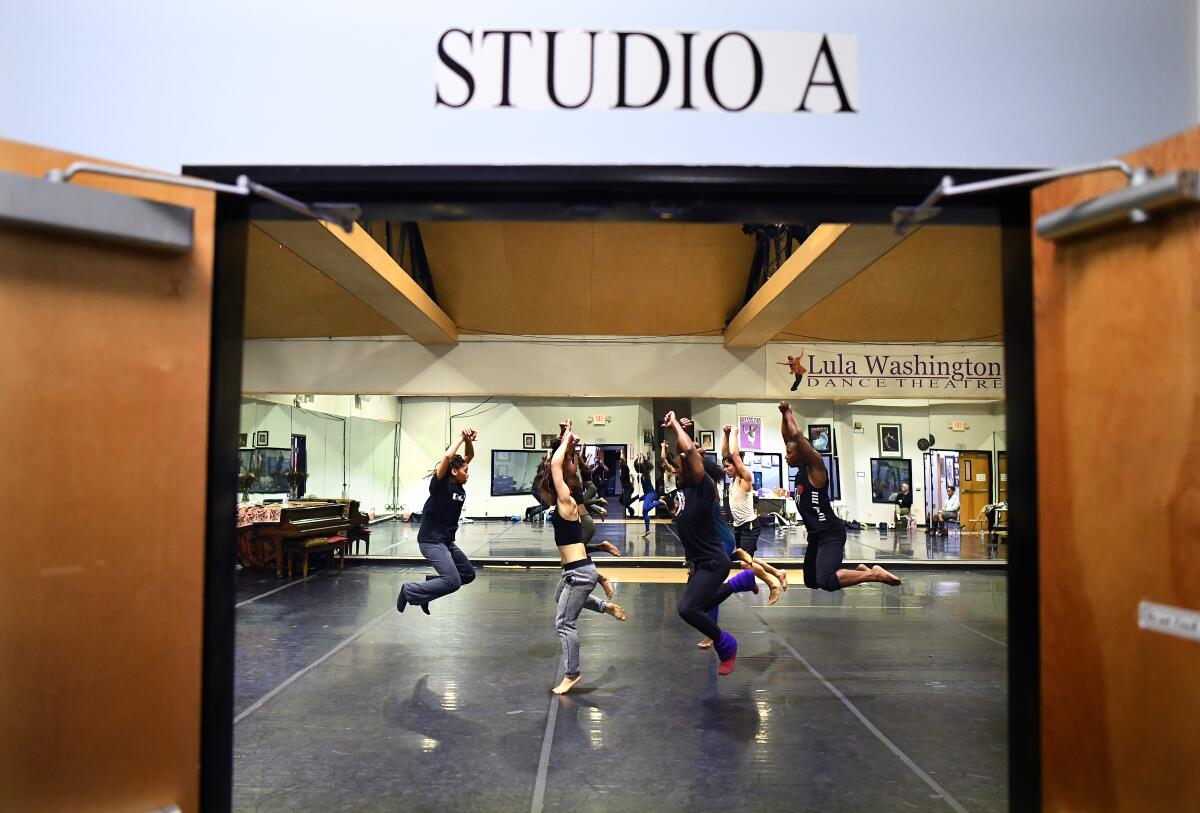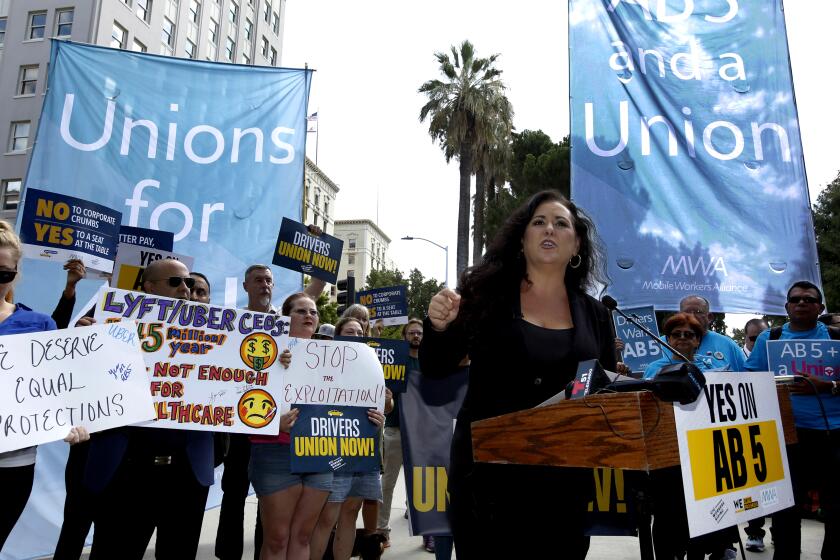The AB5 backlash: Singers, actors, dancers, theaters sound off on freelance law
- Share via
AB5, California’s new gig economy law, has left the state’s performing artist community in a state of fear and confusion.
The law is intended to reduce worker misclassification, making it harder for companies to treat workers as independent contractors. It establishes a test to determine whether workers are employees who should receive minimum wage, paid sick days and other benefits.
But the law’s ambiguous language — specifically the use of the phrase “fine artist” without actually defining the term — already had led arts organizations to postpone or cancel productions and has sent others scrambling to raise more money to comply with the law.
To learn more about AB5’s effect on artists, The Times asked readers to write in.
Few California politicians have written more far-reaching laws in recent years, from workplace rights to election rules, than Lorena Gonzalez. Now the San Diego Democrat faces what could be her toughest fight of all.
We received more than 120 responses from artists across California — jazz and classical musicians, directors of arts nonprofits, magicians, costume designers, actors, a burlesque dancer and freelance food stylist, among others.
The overwhelming majority said AB5 is hurting their careers. Many are unsure how to comply with the law. Others are cutting back on programming or canceling services because of the cost required to convert independent contractors to employees.
Here are some of their responses, lightly edited and condensed for clarity and length.
AB5, the state’s new gig economy law, is intended to protect workers. But small theater, opera and dance companies worry it could ruin them.
Michael Alfera, Los Angeles
Executive and artistic director of L.A. Choral Lab
We are confounded by the definition of fine artist and by Assemblywoman [Lorena] Gonzalez’s conflicting public statements about the matter, so we are unable to tell if we are exempt. If we’re not exempt, the effect of AB5 will be to force us to stop paying our professional choral artists any money at all and to treat them as volunteers.
There simply is not enough money at the levels of the industries that we work in to support programs where all our artists are paid hourly wages and benefits. Arts nonprofits and the artists who collaborate with them have long lived in this middle ground between volunteers and employees, and the effect of AB5 is to completely gut this middle ground.
::
Paul Buckley, Los Angeles
Composer and songwriter for children’s television
The singers, musicians, transcriptionists, engineers and conductors I work with choose 1099 work because it maximizes their responsiveness to a fragile industry. For decades, music recording has been fleeing Los Angeles for cheaper cities, and because of the internet, there is little or no workflow penalty for recording elsewhere.
I have been fighting to persuade my clients to record here in L.A. even as one storied studio after another closes down. The added costs and compliance hazards of AB5 mean that a case that was already hard to make has become nearly impossible.
AB5 will not raise the incomes or improve the working conditions of L.A. musicians and other media workers, whose jobs, unlike those of transportation workers, are easily outsourced. Instead, those jobs will continue to disappear from California, where the penalty for being an independent working artist, or hiring one, is just too great.
::
Bethany Herron, San Francisco
Managing director of Crowded Fire, a small theater in San Francisco
AB5 has made us accelerate some of our growth plans and focus in a bit, but we’re lucky to not be one of the many organizations fearing closure or cutting productions. I actually think AB5 is a push in the right direction, toward treating our professional artists and technicians in a more responsible manner.
But it’s a faulty, flawed and dangerous push, one that is making me terrified about next year, and the year after. So many of our artists were already considering leaving California, and now with the fearful response from arts organizations and what feels like widespread cuts, we’ve just made it even harder to be an artist here.
::
Chris Daley, Los Angeles
Director of Writing Workshops
Until Jan. 1, I was the director of Writing Workshops Los Angeles, a private creative writing school with a faculty of 20 published writers serving 100 to 200 students per quarter in neighborhoods all over Los Angeles for the past 12 years.
We were forced to close down because the costs to convert the instructors to employees — which they did not necessarily want — exceeded the cut Writing Workshops L.A. took from the class fees.
::

Gail Gordon, Los Angeles
Founding executive director of Numi Opera
I have no idea at this point whether I can or if I can afford to continue. Our small company, as with most California small companies, will die. And with us, the performers who survive off ours and other small companies’ pay will be forced to leave their profession.
Classical performers spend most of their lives honing their craft. They take lessons and coaching to be able to perform.
AB5 will annihilate these small opera companies. We are the stepping stones to bigger companies. Without us, our performers will not be able to be prepared for larger roles and bigger paychecks.
::
Graeme Hinde, Los Angeles
Manager of Casual Encounters live band karaoke
So far, all it’s done is add a layer of panic and uncertainty.
We all gig with different bands around town, and no one knows what the law is going to mean for us or how it will eventually be interpreted. I keep a “band fund,” where I put a percentage of each gig’s earnings and tips, and I’m putting more in there now in case there are costs related to AB5 that come due down the road.
That means all the musicians, including me, are getting paid a little less. Depending on how things unfold, we may also lose gigs or have to fold it up entirely, or I may be stuck with a huge bill at the end of the year. The uncertainty has a chilling effect across the board, and small-time gigging musicians like myself are nervous and unsure how to proceed.
::
Colleen Keene, Oak Park
Freelance singer who runs a Christmas caroling company
With Christmas caroling, I usually hire up to 70 singers in a season. The additional cost of making these singers employees will mean that I will probably work with only 50 singers or fewer this season.
Also, I will have to raise my rates to clients by about 30%, so I expect to book fewer gigs overall. I will try to make it work, but it’s very possible that this will be the last year I can run my caroling company.
::
John Highkin, San Diego
Operator of a performing arts nonprofit specializing in circus performance
We’ve seen the tightening of definition of independent contractors coming for a couple of years from the Dynamex decision of the State Supreme Court.
That said, it’s still painful, and we are seeing our artist, technician and teaching artist costs rising 10% to 22%. That’s a lot to absorb in an already resource-tight arts and culture scene.
The added cost inhibits our ability to serve children and families in our City Heights neighborhood, arguably San Diego’s most diverse and low income area. We do not want to cut services, especially free-of-charge circus instruction at a city gym, but are already having to do so.
::
Ari Herstand, Los Angeles
Musician
My accountant estimated it will cost me an additional $6,000 a year to comply. I contract around 50 musicians to play my shows and record on my records. If I have to put them all on payroll, it will crush my business.
::
Marissa Herrera, Los Angeles
Choreographer, cofounder and artistic director of 4C Lab, a nonprofit arts organization for youth
Being a fledgling nonprofit with limited infrastructure, I do not have the capacity to pay artists as employees. I can’t even pay myself that way. Because we are small, I wouldn’t even have enough work to give employees 20 hours a week, and I’d have to pay a very low rate.
My program is starting in a few weeks and I don’t know what to do. I am going to disappoint a lot of youth and their families who depend on our free arts programming if I have to cancel my program because of this law. My nonprofit can’t survive, and we will never be able to grow.
More to Read
The biggest entertainment stories
Get our big stories about Hollywood, film, television, music, arts, culture and more right in your inbox as soon as they publish.
You may occasionally receive promotional content from the Los Angeles Times.












